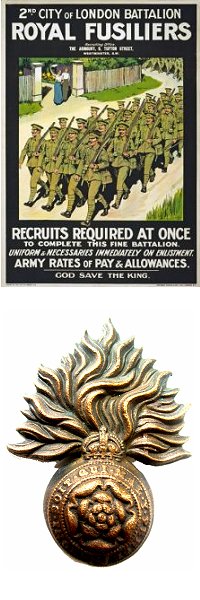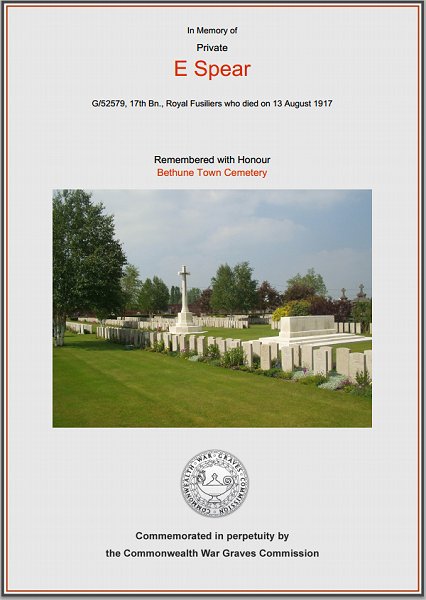yeovil at War
Ernest Spear
Died from wounds sustained in day-to-day trench warfare
Ernest Spear was born in Yeovil in the summer of 1885, the son of leather dyer Francis Spear (b 1847) and Sarah Ann née Norris (b 1859). In the 1891 census Francis and Sarah were listed living at 7 Edwards Buildings, Higher Kingston, with their children; six-year-old Ernest and four-year-old Bessie. They were still at the same address ten years later with another son, Percy, aged eight. Ernest, by now aged 16, was working at the butter factory owned by Aplin & Barrett.
In the autumn of the 1904, at the age of 19, Ernest married Rebecca Ann King at Yeovil. They were to have two children; Bessie Lilian Madge (1905-1919) and Albert Edward (b 1909). By the time of the 1911 census Ernest had moved his family to Wallington, Surrey, where he was employed as a glove leather dresser.
 Ernest's
military career
is a somewhat
vague
- he initially
enlisted at
Carshalton in the
Royal Fusiliers
(Service No
SPTS/5529).
However he was
later
transferred to
the 17th
(Service)
Battalion
(Empire) of the
Royal Fusiliers.
Ernest's
military career
is a somewhat
vague
- he initially
enlisted at
Carshalton in the
Royal Fusiliers
(Service No
SPTS/5529).
However he was
later
transferred to
the 17th
(Service)
Battalion
(Empire) of the
Royal Fusiliers.
Also known as the City of London Regiment, the Royal Fusiliers raised no fewer than 47 battalions for service in the Great War. This makes it the fifth largest after the London Regiment, Northumberland Fusiliers, Middlesex Regiment and King's (Liverpool Regiment).
Although it is not known when Ernest enlisted, as a married man with two young children it is possible that he may have enlisted later in the war.
Nevertheless, the 17th Battalion was formed in London by the British Empire Committee on 31 August 1914 then moved to Warlingham, Surrey, and then to Clipstone Camp, Nottinghamshire, where it joined the 99th Brigade of the 33rd Division.
On 1 July 1915 it was taken over by the War Office and moved to Tidworth, Wiltshire. On 17 November 1915 the Battalion mobilised for war and landed at Boulogne. The 99th Brigade transferred to the 2nd Division and the 17th Battalion transferred to the 5th Brigade of the same Division which was engaged in various actions on the Western front including, during 1916, The Battle of Delville Wood, The Battle of the Ancre, Operations on the Ancre and, during 1917, The German Retreat to the Hindenburg Line, The First Battle of the Scarpe, The Battle of Arleux and The Second Battle of the Scarpe.
While Ernest may
have taken part
in some of all
of these
battles, he died
from wounds
received in the
day-to-day
fighting of
trench warfare,
rather than a
set-piece
battle. He was
taken to 33rd
Casualty
Clearing
Station,
Bethune, an
important
hospital centre,
where he died on
13 August 1917.
He was aged 32.
Ernest was interred in Bethune Town Cemetery, Pas de Calais, France, Grave VI.F.71. His name was added to the War Memorial in the Borough in 2018.
gallery

The Commonwealth War Graves Commission certificate in memory of Ernest Spear.